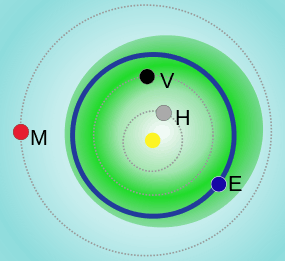2011 GA
| Discovery[1] | |
|---|---|
| Discovered by | Mount Lemmon Survey |
| Discovery site | Catalina Mountains north of Tucson, Arizona, USA |
| Discovery date | April 1, 2011 |
| Designations | |
| MPC designation | 2011 GA |
| MPO 200327 | |
Apollo  NEO, PHA | |
| Orbital characteristics[2] | |
| Epoch 13 January 2016 (JD 2457400.5) | |
| Uncertainty parameter 5 | |
| Observation arc | 70 d |
| Aphelion | 2.8692 AU (429.23 Gm) |
| Perihelion | 0.73727 AU (110.294 Gm) |
| 1.80321 AU (269.756 Gm) | |
| Eccentricity | 0.59114 |
| 2.42 yr (884.44 d) | |
| 305.631° | |
| 0° 24m 25.33s /day | |
| Inclination | 9.8282° |
| 200.4246° | |
| 109.750° | |
| Earth MOID | 0.00686464 AU (1,026,936 km) |
| Jupiter MOID | 2.51622 AU (376.421 Gm) |
| Physical characteristics | |
| Dimensions | 170–380 m[3] |
| 21.0[2] | |
|
| |
2011 GA is a small asteroid that is a Near-Earth object and an Apollo asteroid.
Orbit
The orbit of 2011 GA makes it a Potentially Hazardous Asteroid (PHA) that is predicted to pass within 0.02 AU (3,000,000 km; 1,900,000 mi) of the Earth on Oct 14, 2023.[4] For comparison, the distance to the Moon is about 0.0026 AU (384,400 km). The asteroid passed within 0.06 AU (9,000,000 km; 5,600,000 mi) from Earth around October 15, 1977.
The Jupiter Tisserand invariant, used to distinguish different kinds of orbits, is 3.821.[2]
See also
References
- ↑ "2011 GA". Minor Planet Center. 2011-06-10.
- 1 2 3 "JPL Small-Body Database Browser: (2011 GA)" (last observation: 2011-06-10; arc: 70 days). Jet Propulsion Laboratory. Retrieved 31 March 2016.
- ↑ "ABSOLUTE MAGNITUDE (H)". NASA.
- ↑ "JPL Small-Body Database Browser: (2011 GA) – Close-Approach Data". Jet Propulsion Laboratory. Retrieved 2015-05-05.
External links
- 2011 GA at the JPL Small-Body Database

This article is issued from Wikipedia - version of the 7/26/2016. The text is available under the Creative Commons Attribution/Share Alike but additional terms may apply for the media files.